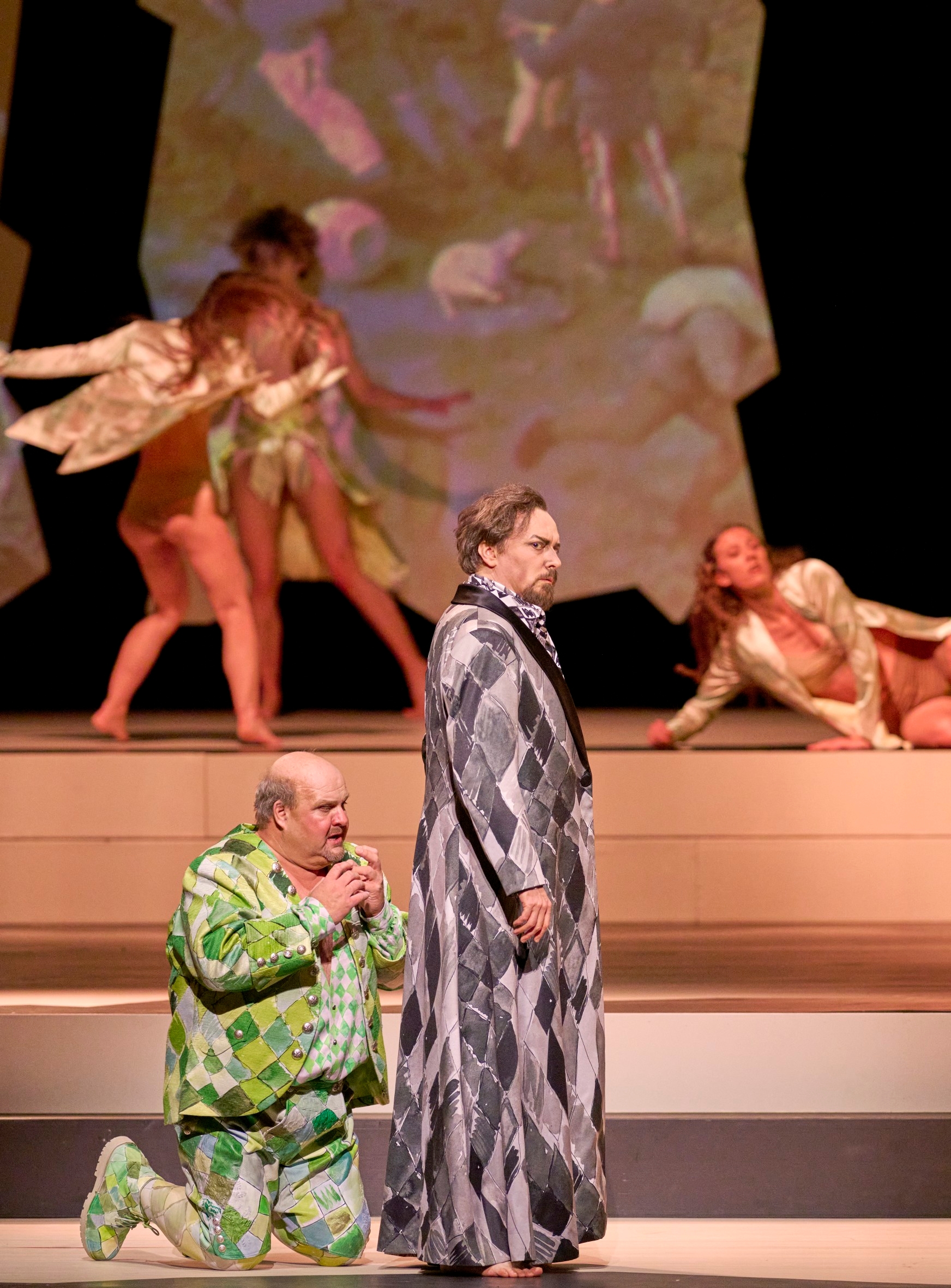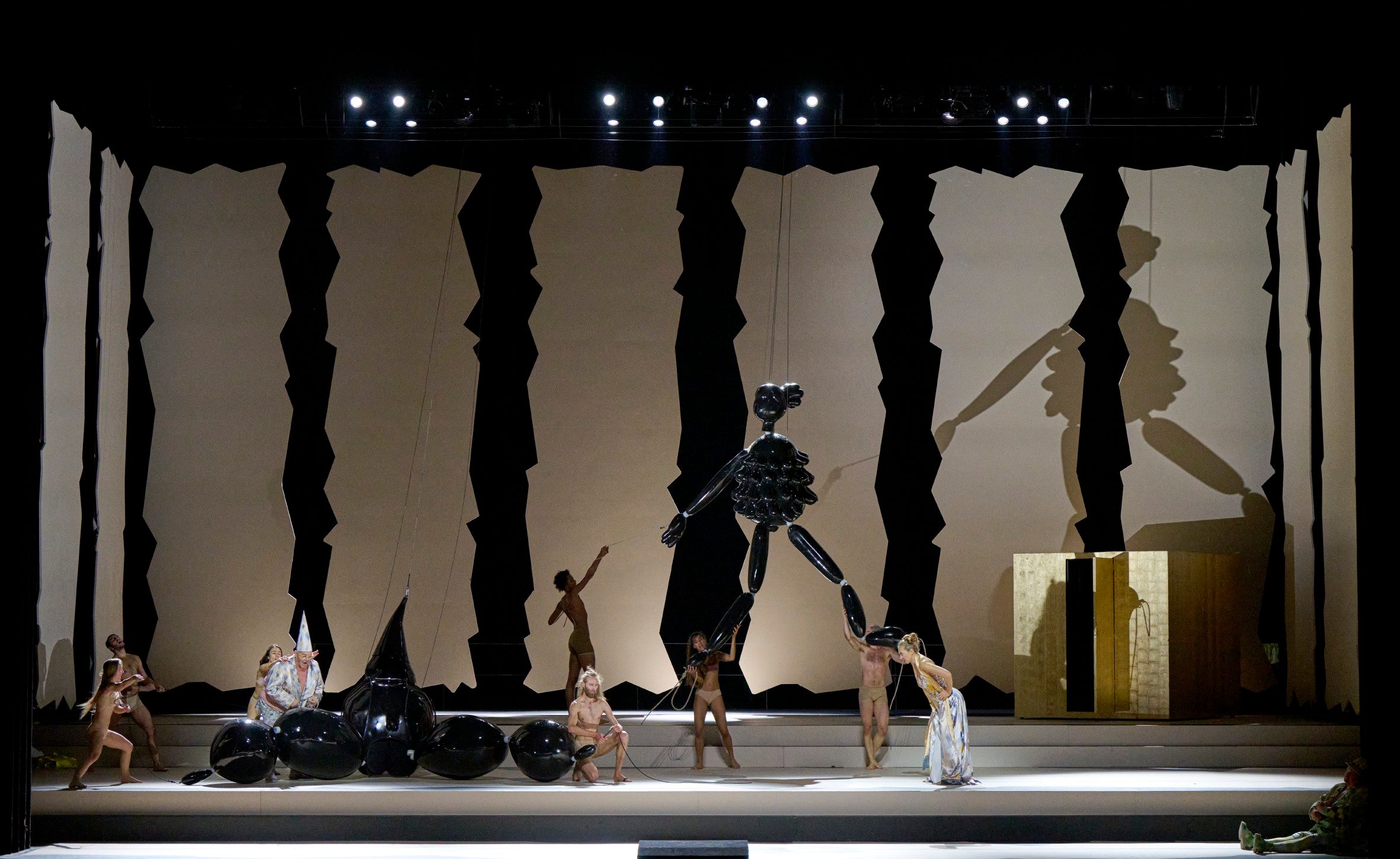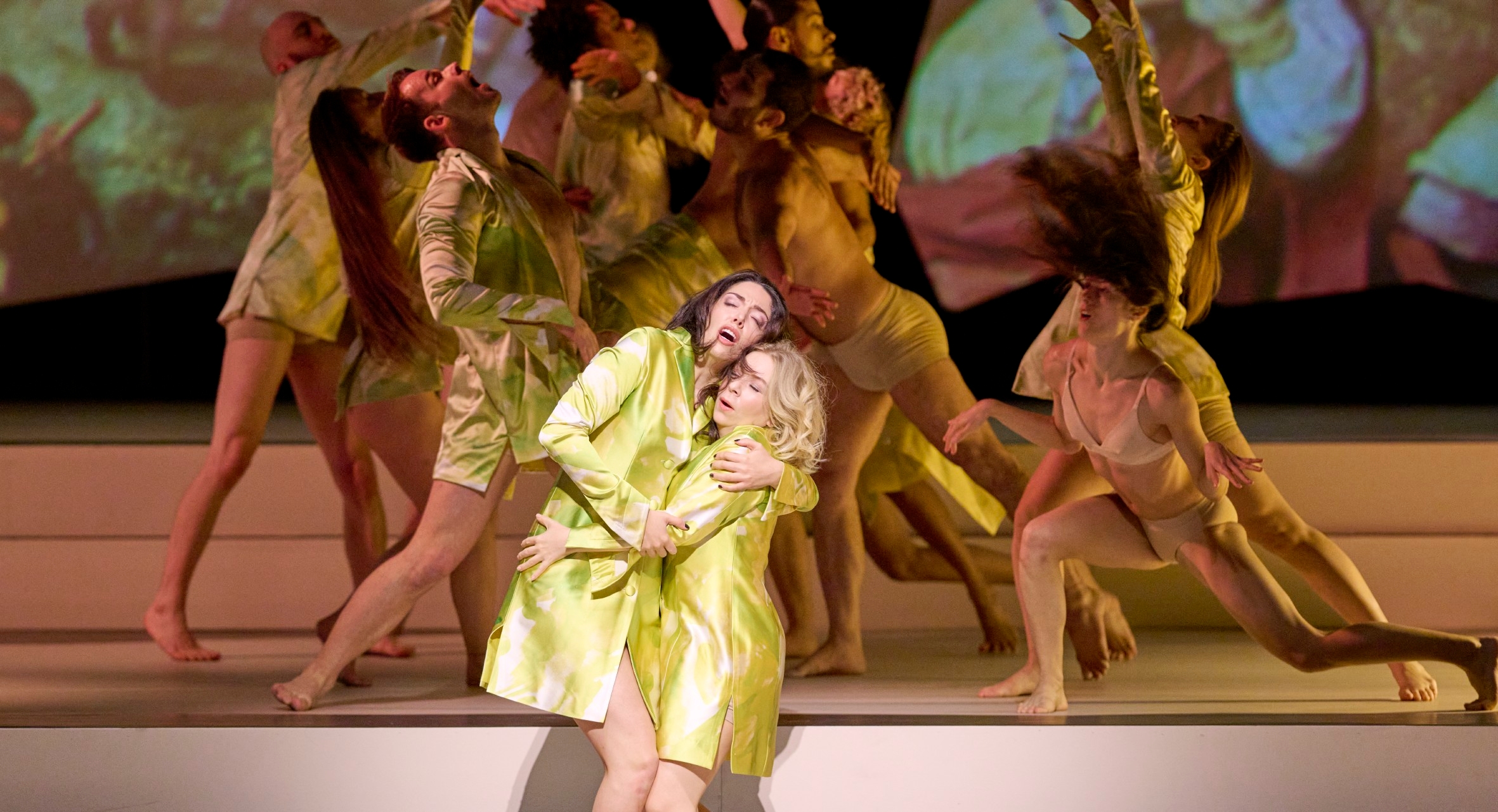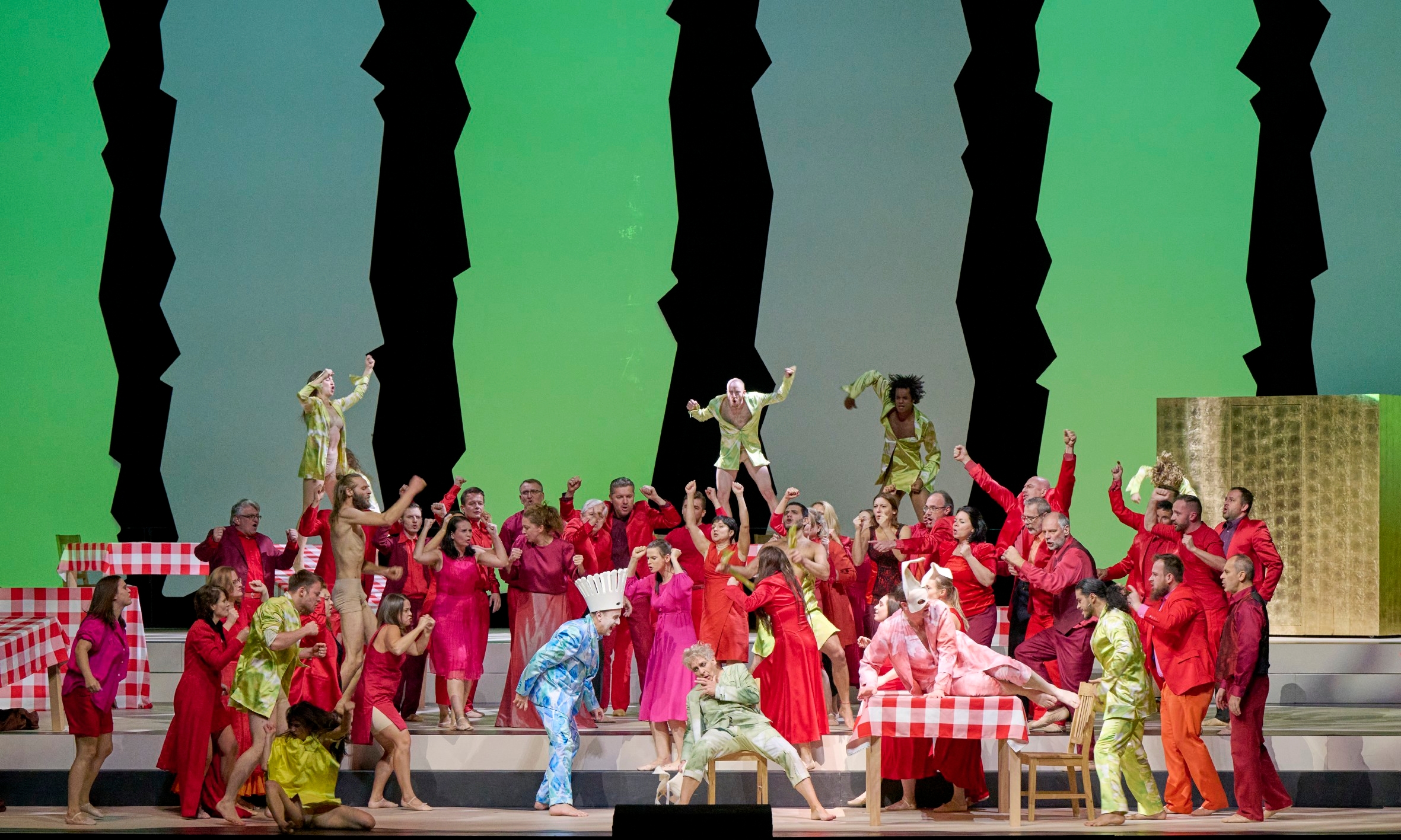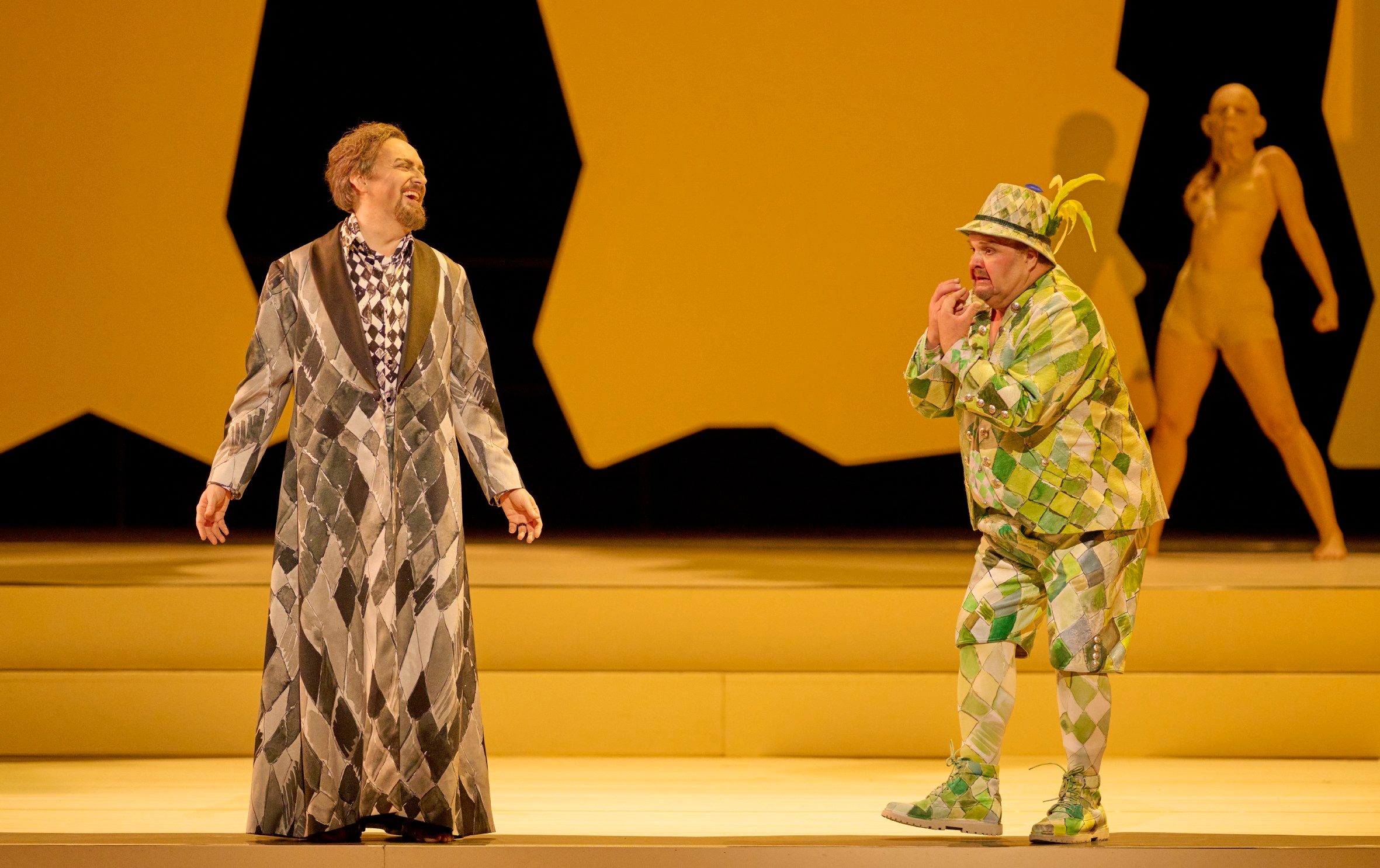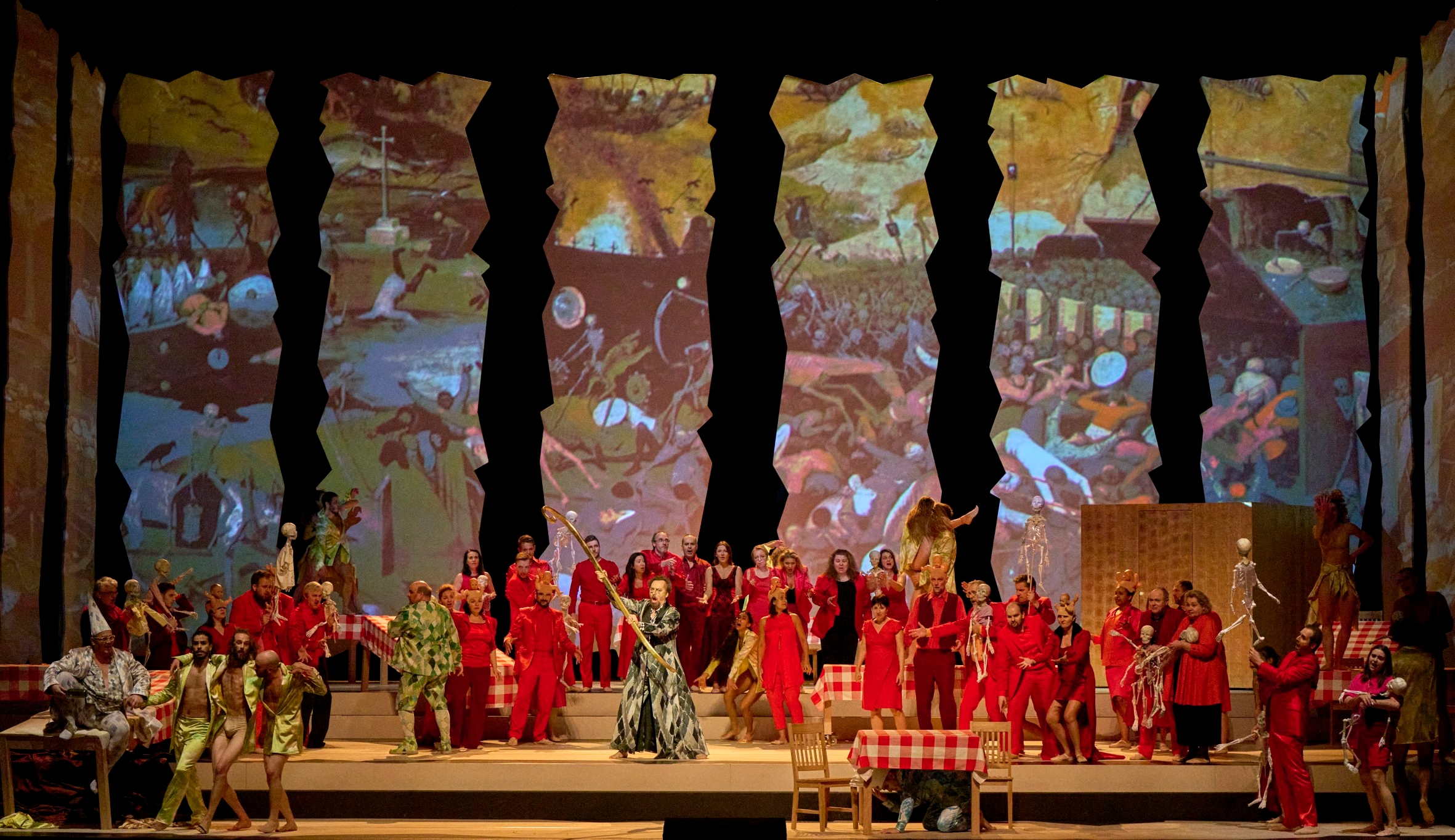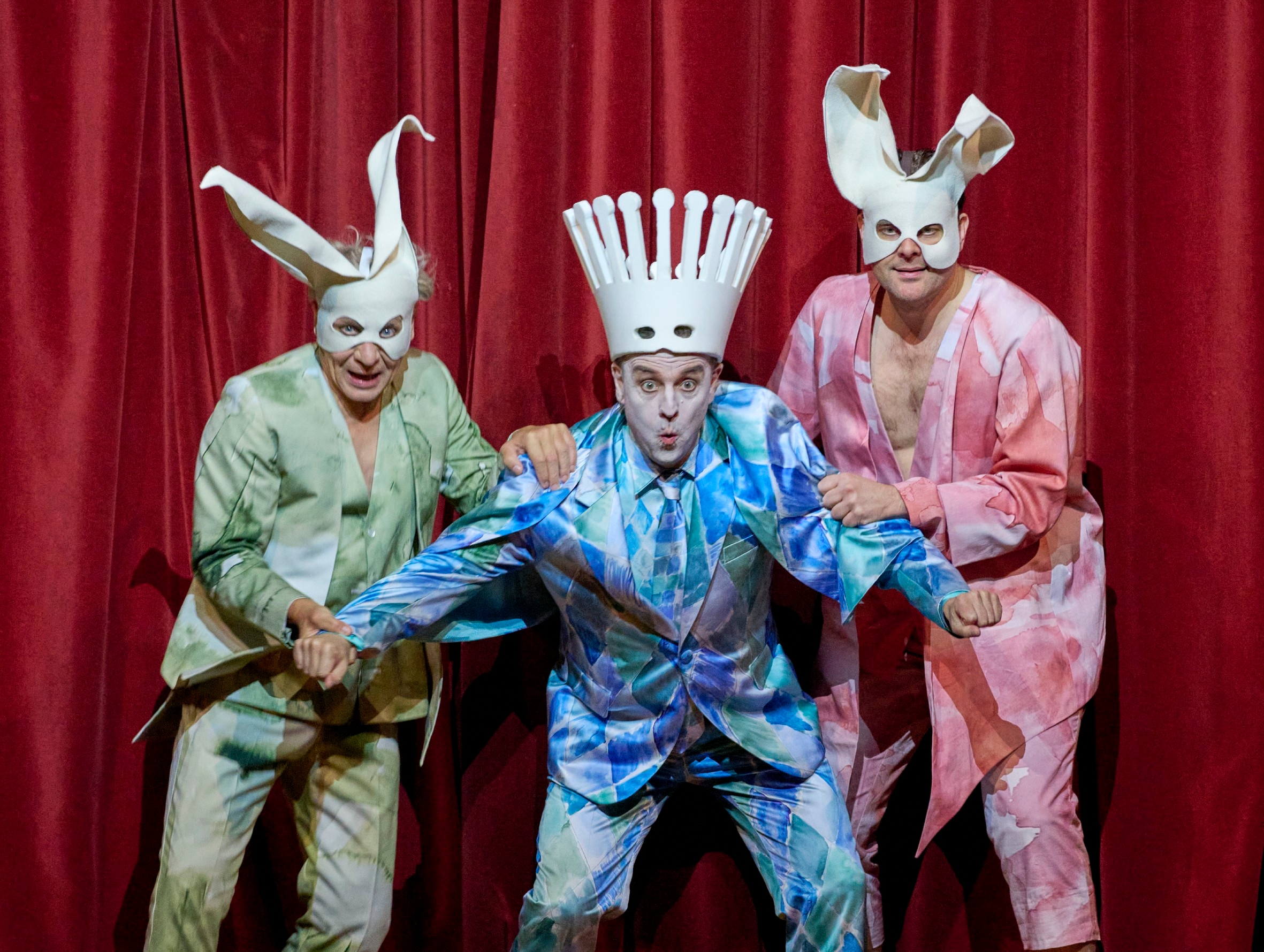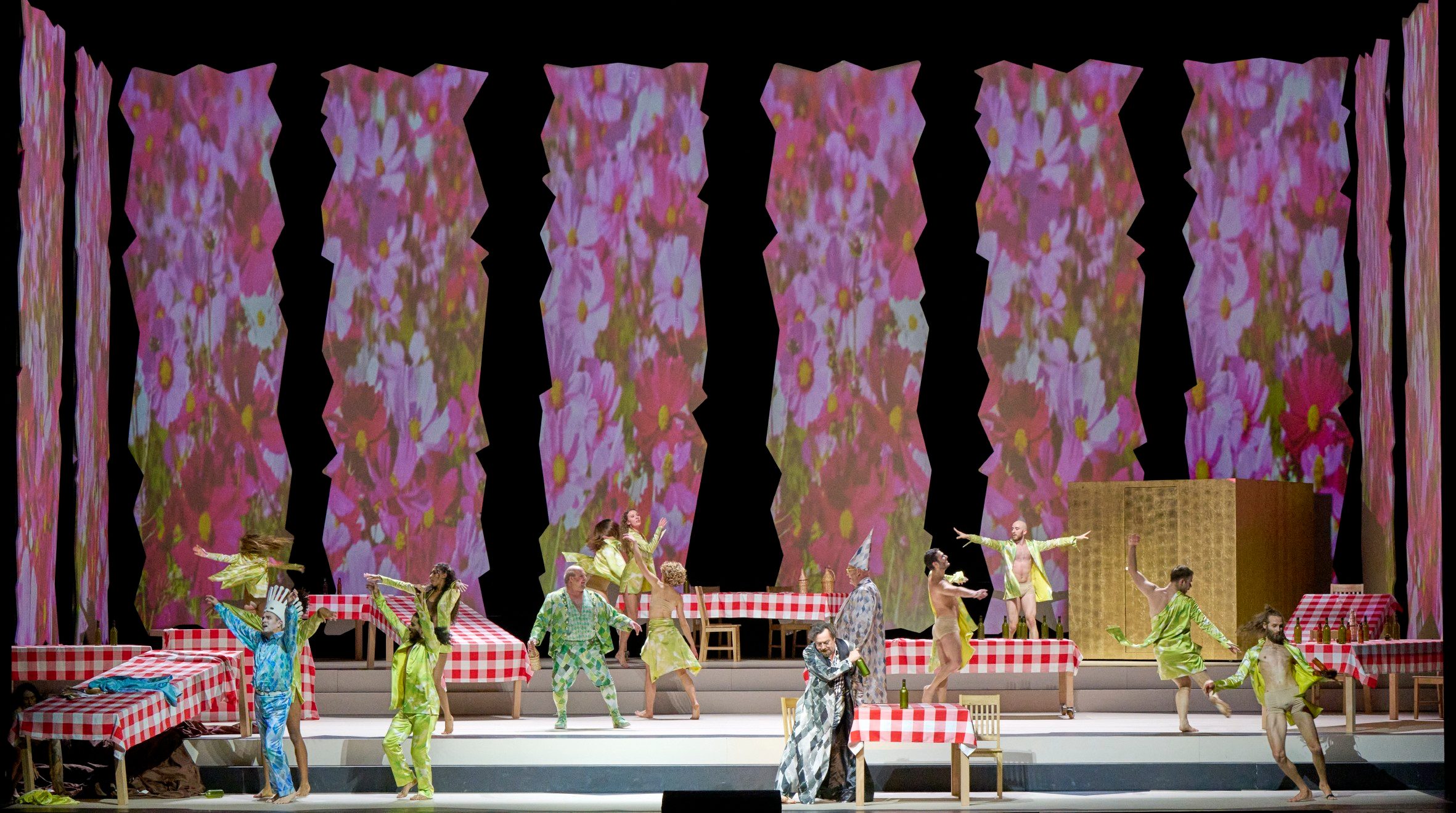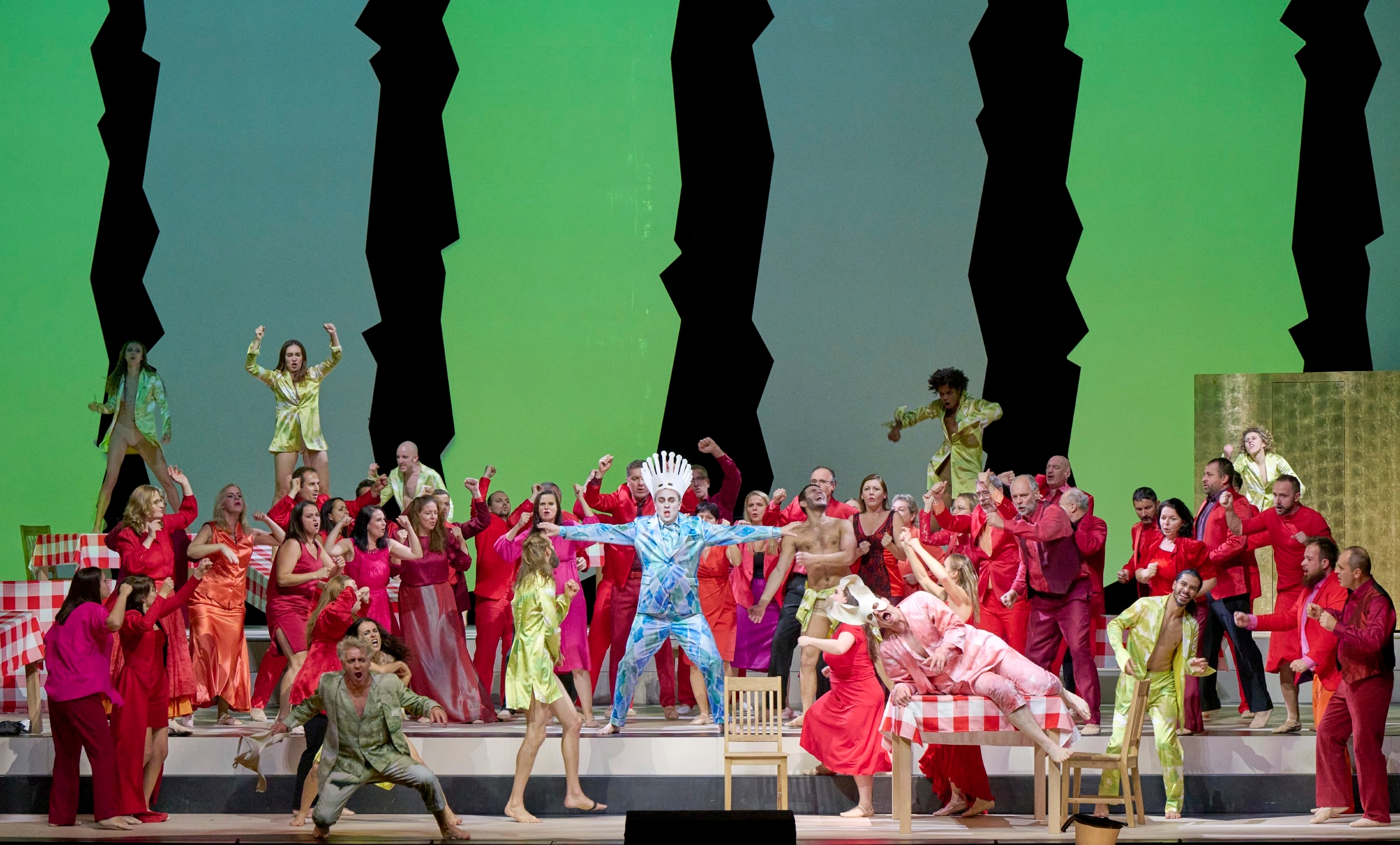
Short Summary
One day, Death, alias Necrotzar, alias the demonic Great Macabre, bursts into an imaginary, corrupt land of milk and honey - the »gluttonous, drunken and whorish« Breughelland.
He wants to proclaim the imminent destruction of the world and frivolous humanity. Seduced and overwhelmed by the unknown desires of life, only Nekrotzar himself dies in the end. Everyone else comes to the moral that their temporary survival should be used to maintain the way of life they have led until then.
Le Grand
Macabre
Storyline
The play is set in the totally run-down yet carefree and prosperous principality of Breughelland in the "so-and-so century".
Piet vom Fass, always slightly drunk (a "wine taster" by profession) and therefore always cheerful, a kind of realistic Sancho Panza, catches sight of the beautiful lovers Amanda and Amando. They are looking for an undisturbed place where they can make love in secret, but this seems difficult to achieve in the always tumultuous Breughelland.

While Piet looks greedily at the couple, Nekrotzar suddenly appears. Nekrotzar, the Great Macabre, is a sinister, shady, demagogic figure, humorless, pompous, with an unshakeable sense of mission. Piet, who knows no horror, mocks Nekrotzar, but he announces that he himself is "Death" and will destroy the whole world tonight with the help of a comet.
He orders Piet to fetch his props - scythe, trumpet, cloak - and to serve him as a servant. The question of whether Piet is willing to do this is not even asked - Nekrotzar is the master and is used to being obeyed without contradiction. Meanwhile, Amanda and Amando retreat to the empty tomb and sleep through the end of the world undisturbed. Nekrotzar rides to the princely capital. The lovers' duet is heard.
In the house of the court astrologer Astradamors: Mescalina is the mistress, who has Astradamors under her unlimited control. At the beginning of the scene, she attacks him, after which Astradamors has to look at the stars. Meanwhile, Mescalina falls asleep sipping red wine and dreams that the goddess Venus is finally sending her a better man.
Finale: Nekrotzar confidently announces the imminent end of the world. Nekrotzar, Piet and Astradamors set off for the princely palace. Astradamors returns once again and sees himself "finally as master in his own house".

Venus does indeed appear and with her Nekrotzar and Piet. Astradamors is delighted to recognize his faithful drinking companion Piet. Nekrotzar approaches Mescalina, embraces her brutally and finally bites her neck like a vampire. She sinks lifelessly to the ground with a hideous scream - Astradamors cheers. Necrotzar orders the corpse to be removed.
Breughelland is ruled by the gluttonous, babyish Prince Go-Go, who is tyrannized by his two corrupt ministers, the leaders of the feuding White and Black parties, who are in no way different from one another. As a result, the affairs of state are conducted in a rather confused manner: The ruling prince has nothing to say, and the two ministers are in constant conflict, constantly threatening to resign, only to reconcile briefly and then fall out all over again. They also force the Prince to perform posture and riding exercises and to "wear the crown with respect". They declare the country's constitution to be empty paper, but at the same time force Go-Go to sign ever new decrees to increase taxes ad infinitum. Prince Go-Go is hungry; he thinks of nothing but food and rejects the ministers for the first time, accepts their resignation and stuffs his mouth. The head of the secret political police ("Gepopo") quickly appears with his entourage. He hands Go-Go a coded message and warns him of the arrival of an angry, demonstrating crowd.
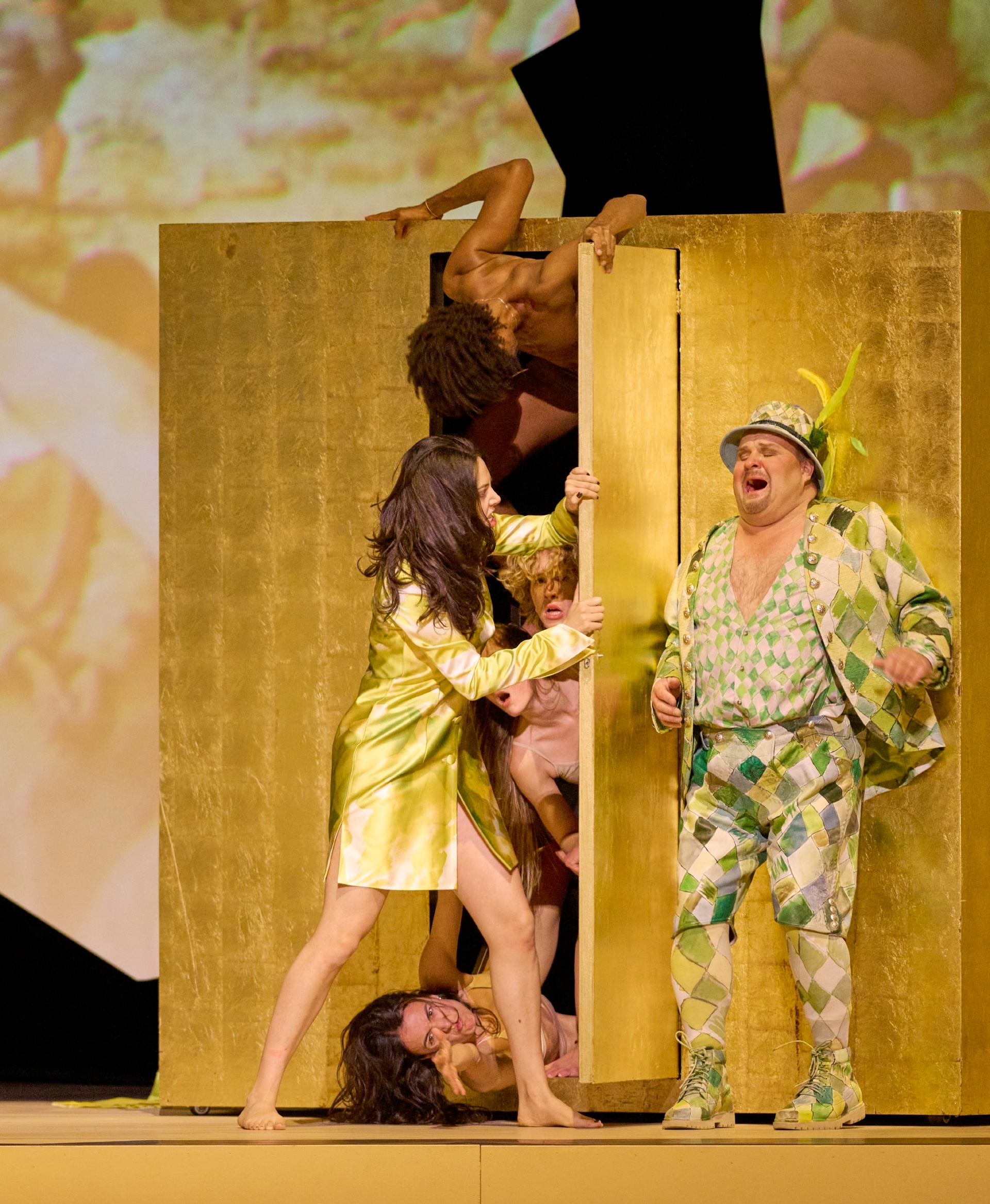
You can hear the people's cries of fear and anger. From the balcony of the throne room, the ministers try to calm the crowd with soothing speeches, but the people call for the prince. The Prince finally speaks to the people and beats up the ministers who are constantly resigning. Suddenly the chief of police appears again. The latest coded message warns of the arrival of a mysterious, threatening figure. The police chief flees in panic, but instead of the dangerous figure, Astradamor appears yodeling merrily, still rejoicing that he has got rid of his wife.

In the meantime, the ministers have also run away. Go-Go and Astradamors sing and dance together. Suddenly an alarm siren wails, then another. Go-Go becomes a child again, he begs for help and Astradamors hides him under the dining table. Necrotzar appears in dark, grandiose pomp. He proclaims confidently and loudmouthed that the end of the world is imminent and declaims twisted, distorted quotes from the Book of Revelation. High above, the "heavenly trumpets" sound.
The people beg Nekrotzar to spare them and he gets caught up in the all-too-earthly hustle and bustle of the Breughellanders. Piet hands him a glass of red wine, and Nekrotzar, in his megalomaniacal obsession, believes he is drinking the blood of his victims, which he needs to strengthen himself so that he can fulfill his "sacred duty". Piet and Astradamors keep topping him up, and the drinking scene becomes increasingly mechanical. Go-Go is also handed one glass of wine after another under the table, and finally all four of them are staggering drunk. Piet introduces the two rulers - Tsar Nekro and Tsar Go-Go - to each other. Suddenly there is an explosion, cries of fear and the ominous glow of the comet. Nekrotzar panics and announces that he is now going to smash the world and falls down drunk.
Piet and Astradamors think they are dead and believe themselves to be in heaven. Staggering, Go-Go appears, feeling that he is alive, but fearing that he is the only person still alive on earth. Three rude warhorses - Ruffiack, Schobiack and Schabernack - appear unexpectedly. They arrest Go-Go as a "civilian" and set about killing him. Suddenly Nekrotzar stands there in all his gauntness. When he recognizes the prince, the three warhorses let Go-Go go.

Weakened by disappointment and alcohol, Nekrotzar wants to die. But suddenly Mescalina appears and pounces on him in a rage. Two warhorses hold Mescalina down and the third brings the two ministers to him. The ministers plead for mercy in a cowardly and mocking manner, as they have only ever had the people's welfare in mind. They and Mescalina accuse each other of inventing astronomical taxes, introducing the Inquisition and plotting to eliminate the prince.
The discussion leads to a general brawl until everyone is lying on the floor. Piet and Astradamors walk in, still thinking they are in heaven. The prince greets them and gives them wine to drink. This is enough for Nekrotzar: out of grief, he begins to shrink, becomes smaller and smaller and finally disappears without a trace. The lovers emerge from the grave in a rather disheveled state.
Jan Lauwers: a great theater maker and universal artist who has been shaping international art in the most diverse fields for many years. His wondrously fascinating theater evenings - such as Monteverdi's L'incoronazione di Poppea at the Staatsoper - are as enchanting as they are thought-provoking. Now he takes on György Ligeti's musical theater landmark Le Grand Macabre.
The synaesthetically inclined Ligeti - he associated colors and shapes, machines, physical apparatuses with musical processes and, conversely, sounds and noises with colors, words and letters - also sought »the total fusion of action and music« in Le Grand Macabre, i.e. a stage event through music. A deliberately crazy and »exaggerated music«, mind you, which is characterized by an orchestration that almost breaks the rules. In addition to the rather small string section, which represents the lyrical element, the instruments include a bass trumpet, harmonica, whistles, six doorbells and, last but not least, twelve differently tuned car horns, which open the opera like fanfares and symbolize the broken, unsteerable world of Breughelland on the one hand and are also remotely reminiscent of Monteverdi's Toccata to L'Orfeo on the other.
The end of the world does not usually happen. With his only opera Le Grand Macabre, György Ligeti succeeded in creating a grand and discursive world theater in which the unvarnished human condition with all its drives and weaknesses brings down nothing less than an impending apocalypse.
György Ligeti's grotesque masterpiece, which premiered at the Royal Opera in Stockholm on April 12, 1978, is not only a central work in the oeuvre of the Austro-Hungarian composer, but has also become a permanent fixture in the repertoire worldwide. Through ironic distance, alienation and a continuous ambiguity that »takes the serious humorously and the comic deadly seriously«, the basic theme of the opera - the necessary abolition of fear and the triumph of Eros - is unfolded before the eyes and ears of the audience.
